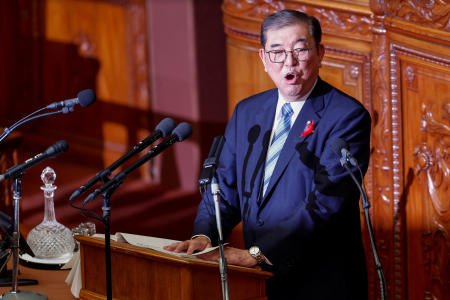
- ARAB NEWS
- 31 Jul 2025

TOKYO: Japanese Prime Minister Shigeru Ishiba’s recent remark signaling opposition to interest rate hikes by the Bank of Japan has taken the financial market by surprise, as he had been viewed as a proponent of rate hikes.
The market is being perplexed by the statement by Ishiba, who had been critical of Abenomics, the late former Prime Minister Shinzo Abe’s economic policy mix, which included massive monetary easing.
Ishiba had long voiced criticisms regarding the side effects of the BOJ’s prolonged large-scale monetary easing, saying that “the Japanese economy will not be cured with unprecedented monetary accommodation.”
Investor concerns about Ishiba’s economic policies grew after he beat former economic security minister Sanae Takaichi in a runoff in the leadership election of the ruling Liberal Democratic Party on Sept. 27. Takaichi, who led the first round of voting in the election, supports the continuation of the Abenomics policies.
The concerns caused Japan’s benchmark Nikkei 225 stock average to plunge over 1,900 points Monday, the first business day after the LDP election, in a phenomenon called the “Ishiba shock.”
The prime minister met with BOJ Governor Kazuo Ueda on the evening of Wednesday, one day after he took office.
After the meeting, Ishiba told reporters that he does not believe the country is currently in an environment warranting an additional interest rate hike. This led to a rapid weakening of the yen and a jump in stock prices the following day.
“He apparently corrected course to avoid being viewed as a rate hike proponent” ahead of the Oct. 27 election for the House of Representatives, the all-important lower chamber of Japan’s parliament, a senior official at an economy-related government agency said.
Ishiba’s remark is viewed as possibly undermining the BOJ’s independence from the government. While central banks tend to face government pressure for easing monetary policies, the BOJ law ensures the independence of the Japanese central bank’s monetary policy.
“It may have been a careless mistake by the prime minister, who is not familiar with economic policy management,” Ryutaro Kono, chief economist at BNP Paribas Securities (Japan) Ltd., said of the statement Ishiba made after the meeting with Ueda. A prime minister “should refrain from making remarks that could violate the BOJ law,” Kono added.
Kono expressed concern that the yen may weaken further if many people come to believe that the BOJ cannot increase interest rates due to political pressure, leading to consumers suffering from further inflation as a result.
Ishiba explained Thursday night that his remark in question had indicated that he was in agreement with Ueda, who told him in the Wednesday meeting that there is ample time to consider future interest rate hikes.
“A situation in which a remark from the prime minister causes financial markets to move wildly should be avoided,” Yuichi Kodama, chief economist at Meiji Yasuda Research Institute Inc., said.
Former Prime Minister Fumio Kishida, Ishiba’s immediate predecessor, had not intervened significantly in Ueda’s efforts to normalize monetary policy.
“With Kishida, who appointed (Ueda as BOJ governor), gone, we will have to explore how to deal with the new (Ishiba) administration,” a senior BOJ official said.
JIJI Press